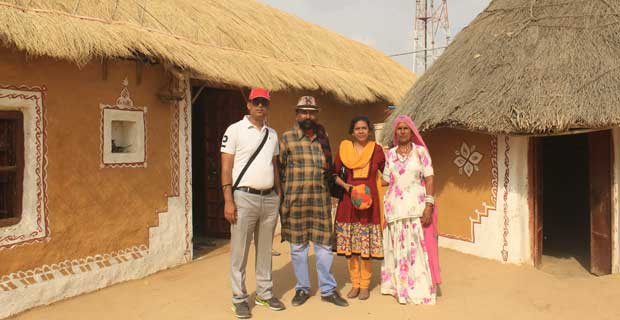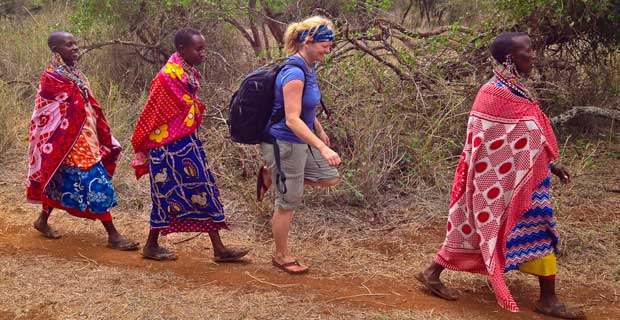Sponsored Listings:
A Sustainable and Responsible Tourism approach of United Nations #IY 2017
Responsibly Yours: Guest Column
A Lajwanti Naidu
The United Nations 70th General Assembly has designated 2017 as the International Year of Sustainable Tourism for Development. This is a unique opportunity to raise awareness of the contribution of sustainable tourism to development among public and private sector decision-makers and the public, while mobilising all stakeholders to work together in making tourism a catalyst for positive change. In this context, the International Year of Sustainable Tourism for Development aims to support a change in policies, business practices and consumer behavior towards a more sustainable tourism sector that can contribute to the Sustainable Development Goals (SDG).
The #IY2017 will promote tourism’s role in the following five key areas:
(1) Inclusive and sustainable economic growth
(2) Social inclusiveness, employment and poverty reduction
(3) Resource efficiency, environmental protection and climate change
(4) Cultural values, diversity and heritage
(5) Mutual understanding, peace and security

The World Tourism Organisation (UNWTO), the United Nations Specialised Agency for Tourism, has been mandated to facilitate the organisation and implementation of the International Year, in collaboration with governments, relevant organisations of the United Nations system, international and regional organisations and other relevant stakeholders.
The Heads of State and Government and High Representatives, meeting at the United Nations Headquarters in New York from 25-27 September 2015 as the Organisation celebrates its 70th anniversary, have decided today on new global Sustainable Development Goals. This has been a historic decision on a comprehensive, far-reaching and people-centered set of universal and transformative goals and targets. Globally we citizens commit ourselves to working tirelessly for the full implementation of this Agenda by 2030. It is therefore recognised that eradicating poverty in all its forms and dimensions, including extreme poverty, is the greatest global challenge and an indispensable requirement for sustainable development.
Therefore a commitment to achieve sustainable development is in its three dimensions – Economic, Social and Environmental in a balanced and integrated manner. In between now and 2030, several globally faced challenges are addressed to end poverty and hunger everywhere; to combat inequalities within and among countries; to build peaceful, just and inclusive societies; to protect human rights and promote gender equality and the empowerment of women and girls; and to ensure the lasting protection of the planet and its natural resources.
The governments are here to resolve and to create conditions for sustainable, inclusive and sustained economic growth, shared prosperity and decent work for all, taking into account different levels of national development and capacities.
The Agenda 2030 is of unprecedented scope and significance. It is accepted by all countries and is applicable to all, taking into account different national realities, capacities and levels of development and respecting national policies and priorities. These are universal goals and targets which involve the entire world, developed and developing countries alike. They are integrated and indivisible and balance the three dimensions of sustainable development.
Globally it has been envisaged a world free of poverty, hunger, disease and want, where all life can thrive. Also, a world free of fear and violence and world with universal literacy. A world with equitable and universal access to quality education at all levels has been visualised to health care and social protection, where physical, mental and social well-being are assured. A world where the citizens reaffirm our commitments regarding the human right to safe drinking water and sanitation and where there is improved hygiene; and where food is sufficient, safe, affordable and nutritious. A world where human habitats are safe, resilient and sustainable and where there is universal access to affordable, reliable and sustainable energy.

Several countries in the world look up for universal respect for human rights and human dignity, the rule of law, justice, equality and non-discrimination; of respect for race, ethnicity and cultural diversity; and of equal opportunity permitting the full realisation of human potential and contributing to shared prosperity.
United Nations envisages a world which invests in its children and in which every child grows up free from violence and exploitation. A world in which every woman and girl enjoys full gender equality and all legal, social and economic barriers to their empowerment have been remove. Also a world in which every country enjoys sustained, inclusive and sustainable economic growth and decent work for all. A world in which consumption and production patterns and use of all natural resources – from air to land, from rivers, lakes and aquifers to oceans and seas- are sustainable. One in which democracy, good governance and the rule of law as well as an enabling environment at national and international levels, are essential for sustainable development, including sustained and inclusive economic growth, social development, environmental protection and the eradication of poverty and hunger. One in which development and the application of technology are climate-sensitive, respect biodiversity and are resilient. One in which humanity lives in harmony with nature and in which wildlife and other living species are protected.
Is this progress really possible in the present context where there is global pandemonium? With a positive affirmation truly it is possible with a 5 P agenda.
People
The vast ocean of humanity is determined to end poverty and hunger, in all their forms and dimensions. This is made possible with the integration from local to global. This in turn will ensure that all human beings can live in dignity and equality and that too in a healthy environment.
Planet
Various policies are framed to protect the planet from degradation, including through sustainable consumption and production, sustainably managing its natural resources and taking urgent action on climate change, so that it can support the needs of the present and future generations. Campaigns all over the world are promoted to sensitise the public to practice eco-friendly measures.
Prosperity
Prosperity is determined in various parameters. This is basically to ensure that all human beings can enjoy prosperous and fulfilling lives and that economic, social and technological progress occurs in harmony with nature.
Peace
The United Nations is determined to foster peace and inclusive societies which are free from fear and violence. There can be no sustainable development without peace and no peace without sustainable development. This is a time tested and a globally accepted fact.
Partnership
Governments are determined to mobilise the means required to implement Agenda 2030 through a revitalised Global Partnership for Sustainable Development, based on a spirit of strengthened global solidarity, focused in particular on the needs of the poorest and most vulnerable and with the participation of all countries, all stakeholders and all people.
Thus in conclusion the goals and targets will stimulate action over the next 15 years in areas of critical importance for humanity and the planet. (Source UNWTO.org)
Source: travelnewsdigest.in










